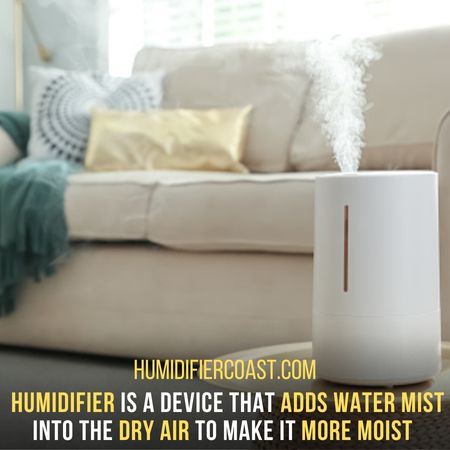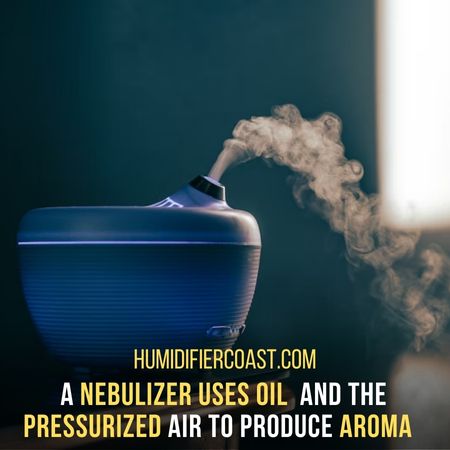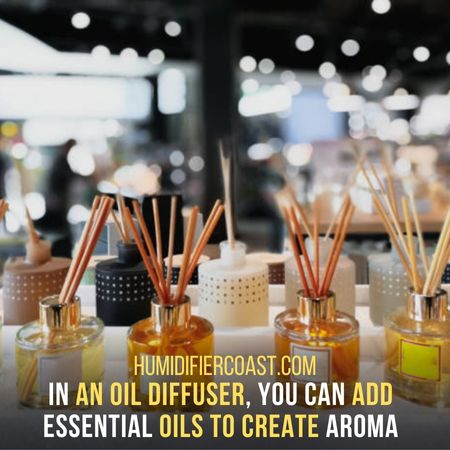You should know some differences between a humidifier and an oil diffuser. Otherwise, you may buy the wrong product for your home or office.
A humidifier and an oil diffuser have various distinctions. But most people confuse them with each other. Both have different purposes, so choose what you are looking for.
Differences Between A Humidifier And An Oil Diffuser – 7 Key Points
Humidifiers and diffusers seem alike. Many confuse a humidifier with an oil diffuser, but both are different.
This happens because sometimes both products have similarities in appearance and working principles.
Humidifiers and diffusers emit different types of mists as per their nature. Moreover, both devices add liquid into the air to make it healthier and more effective.
Besides that, there are many differences between a humidifier and an oil diffuser as well. However, here are some points that can clarify how both are different.
1. Purpose:
People use humidifiers and diffusers for different reasons. Both have many health benefits but work for different things. The purpose of the two devices is;
Humidifier:
The humidifier is a device that adds water mist into the dry air to make it more moist and efficient. Being human, we need balanced air to be healthy.

A humidifier is a necessity in cold and dry regions. According to experts, we need 30% to 50% humidity in the air. Otherwise, we will suffer from health and environmental problems.
Itchy eyes, nose and throat congestion, cough, dry skin, asthma, and so on are common risks to human health.
On the other hand, dry air can damage your belongings like electronics, floors, walls, furniture, etc.
So then, humidifiers are useful to avoid damage caused by dry air. They maintain a balanced air and healthy humidity level in the air when humidity is not present.
Oil Diffuser:
An oil diffuser is a device that uses essential oils to dispense into the air to produce a pleasant aroma.
We need to use a diffuser for aromatherapy. Because of its therapeutic effects, it is very beneficial for psychological health. At least a hectic day deserves a refreshing room to relax.
Essential oils are thick compounds that are extracted from plants. Having refreshing aromas enhance the atmosphere of the room.
People use oil diffusers in rooms with bad odors and smelly air. Also, it is very helpful to clean the air by removing the smell and allergens.
2. Benefits
Humidifiers and diffusers have many health and environmental benefits. Some of the most popular advantages of using such products are as follows.
Humidifier:
Some benefits of using a humidifier include;
– Dry air causes nose, throat, and chest congestion, which leads to flu, cough, and infection. Using a humidifier eliminates such discomfort.
– It prevents red and itchy eyes.
– It is beneficial to have soft, moist, and fresh skin.
– It improves the durability of floors, walls, paints, and furniture.
– It avoids the failure of electrical appliances and gadgets.
Oil Diffuser:
Oil diffusers have many advantages, such as;
– It improves the room’s atmosphere through refreshing odors. Oils like lavender oil, lemon oils, tea tree oils, jasmine oils, lemongrass oil, etc. are great.

– It helps in creating calming effects with aromatherapy.
– It lifts mood and energy levels.
– It is useful for glowing skin because essential oils are healthy for your body.
– It purifies the air due to the antibacterial properties of essential oils.
3. Working Mechanism:
In general, a humidifier and an oil diffuser use different fluids and create a fine mist to mix them into the air. There are many types of humidifiers and diffusers on the market.
Some types of both products work in a simple principle like the ultrasonic method. In both cases, ultrasonic vibrations convert the liquid into a mist form.
Here we are discussing the differences between a humidifier and an oil diffuser. So, here are some types that work on different mechanisms.
Humidifier:
A humidifier makes two categories of water mist. Unlike diffusers, you can have warm or cool mist in the humidifier as per your needs.
– Warm Mist Humidifier: This type of humidifier has a built-in heater. First, it boils the water. When boiling water starts having steam, the unit emits it through a nozzle. Hence vapors moisturize the air.
– Cool Mist Humidifier: Sometimes we need a cool mist, i.e., in the case of wooden floors or libraries.
A cool mist humidifier uses a fan inside that blows the air. Through the fan, a wet pad creates mist through the filter. As a result, cool mist adds humidity to a dry place.
Oil Diffuser:
Some oil diffusers also use heaters and fans but in different ways. These two types are different from the humidifier in operational terms.
– Candle Diffuser: A humidifier has an electric heater, but a candle diffuser uses a candle to warm up the oils. A continuous slow heat helps in evaporating the essential oils.
By doing so, a light fragrance fills the room with a light and refreshing smell.
– Nebulizer: A nebulizer works in entirely different ways. It uses oil in the thin tubes of diffusers. Then, with the help of pressurized air, oils produce aroma through the diffuser.

This is the best type of diffuser. This is because it takes less time to dispense oil molecules in the air.
4. Fluids:
The nature of the fluid is one of the most popular differences between a humidifier and an oil diffuser. Although, the basic purpose of both units is to diffuse the substance in the air.
But both use different types of liquids according to the device’s function. Here is the difference as;
Humidifier:
Humidifiers add moisture to the dry air through water vapors or fine mist. So, you need to use water in the water tank of a unit.
There is no specific rule for using water. You can fill the tank with distilled water or even tap water. However, using distilled water is good for the durability of the humidifier.
Oil Diffuser
Using water is not a good idea in oil diffusers. In an oil diffuser, you can add essential oils to create aromas.

Always buy original essential oils because using cheap oils can ruin your diffuser. A diffuser has a small tray to hold essential oils. In case you add water, it will cause you damage.
5. Required Heat
In a humidifier and oil diffuser, heat helps the liquid in evaporation. But the amount of heat is different in the two cases.
Humidifier:
A steam humidifier requires high temperatures to evaporate the water. Water boils at 100C, so the humidifier needs a heater with higher temperature units.
The high temperature of the heating device helps water to produce steam. Unlike oil diffusers, a low or medium temperature is ineffective for the warm mist humidifier.
Oil Diffuser:
In the case of an oil diffuser, it needs lower temperatures. Because essential oils are very sensitive to high temperatures. If you use extra heat, you will waste your oils.
At high temperatures, oils will lose their effectiveness by burning essential nutrients. Too, they don’t remain beneficial anymore.
6. Capacity:
The capacity for holding water and oil is different in different devices. You cannot use oils equal to water, so both products have different capacities.
Humidifier:
Humidifiers use water, so there are high amounts of water in them. Thus, it has a huge tank to hold enough water to work for a few hours. Generally, the tank size varies depending on the size of the unit.
But, an average tank contains half of a gallon. So, it is equal to 3800 liters of water. Moreover, water consumption depends upon the number of hours a humidifier runs.
Oil Diffuser:
Oil diffusers need smaller tanks to hold the essential oils. Even smaller oil diffusers have a small tray to place oil drops.
An average oil tank has a capacity of 200 ml. Su should use 5-6 drops of your favorite oils for better results and long-lasting use.
7. Maintenance:
A product works well with regular maintenance. If you take care of the things, they last for longer periods. In a similar way, a humidifier and an oil diffuser demand regular attention.
Both of them need different methods of treatment. For example;
Humidifier:
Humidifiers are normally less polluted compared to oil diffusers. Also, water is itself a purifier and diluted in nature.
Still, you need to maintain some cleaning habits. For example, you can empty the water tank and wash it with soapy water once a week. This will prevent the accumulation of minerals on the base.
Furthermore, you should also clean your humidifier every month. Once a month, add enough amount of white vinegar to the tank and wait for 20-30 minutes.
This method is effective in disinfecting the water tank. Otherwise, bacteria can contaminate the water, and the humidifier will produce unhealthy vapors.
Oil Diffuser:
Oil diffusers are sensitive and need more maintenance than a humidifier. Further, they are delicate, so you need to be careful about them.
They demand to be clean every time before putting essential oil drops.
To clean a diffuser, add a dishwasher into a bowl of lukewarm water and mix well. Then clean the tray or tank with the help of soft fabric or cotton.
Use cotton buds for internal components and clean the diffuser. Remember, you don’t have to wait a week for a humidifier. Instead, clean the unit every time before changing the oil.
Conclusion:
A humidifier and an oil diffuser have various advantages in different ways.
If you need moist air, you can use a humidifier. In contrast, oil diffusers are beneficial for adding a refreshing aroma to your home. However, using a single product for two different functions can ruin it.
This post has some major differences between a humidifier and an oil diffuser. So first, know the difference, choose what you need and then go to the market.
- How to Clean a Warm Mist Humidifier in 7 Easy Steps - October 9, 2023
- Warm Mist Humidifier: 5 Uses and 7 Life-Changing Benefits - October 9, 2023
- How to Clean a Cool Mist Humidifier? 4 Easy Steps - September 22, 2023
Leave a Reply